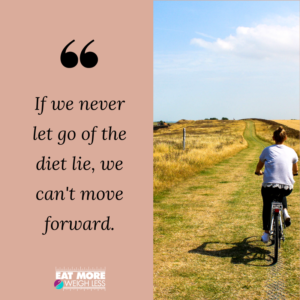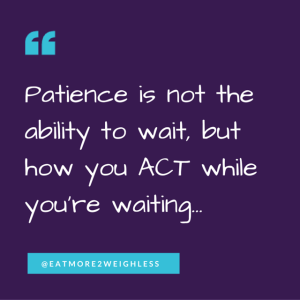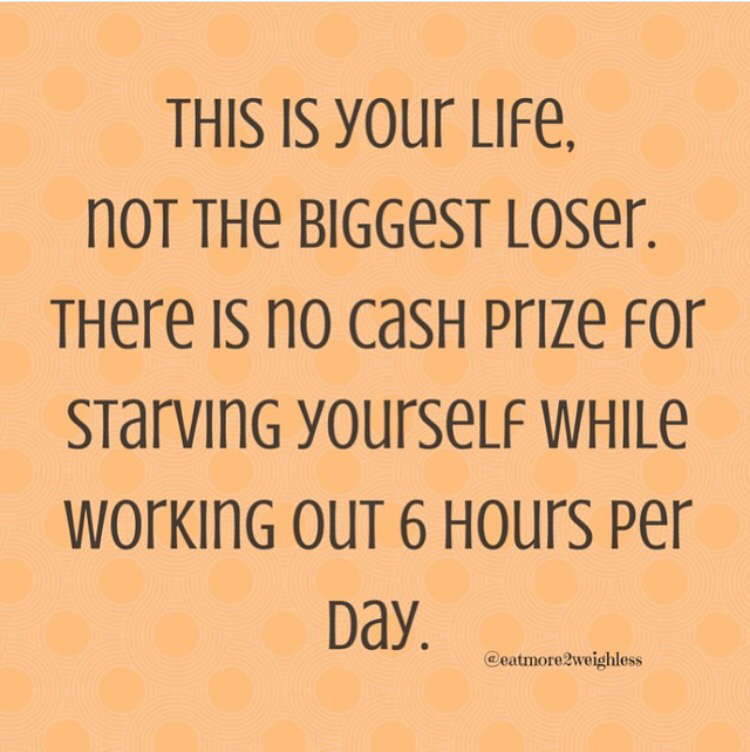 You’ve made the plunge into a metabolic reset, and you’re determined to stick it out as long as it takes.
You’ve made the plunge into a metabolic reset, and you’re determined to stick it out as long as it takes.
You are no longer restricting foods or food groups but learning how to include some new foods into your healthy eating plan. You love the freedom of some extra food. You can go out to eat or enjoy a piece of birthday cake, guilt free. You have more energy, you’re sleeping better at night, and are killing it in the gym. You are prepared to put in the time, so that you can attain your fitness goals without sacrificing your life
But sometimes, you may feel so out of control, and it scares you!
You may not understand why you are feeling this way. After all, while you were restricting your calories, you hardly ever felt hunger. You may feel tempted to go back to restricting calories.
What’s going on?
First of all, know that this has happened to just about anyone who has walked down this road. You are not alone, and experiencing these symptoms does not mean that you are undisciplined or lazy.
Experiencing hunger is a GOOD thing. Hunger and fullness are our body’s ways to control our dietary intake. Both undereating and overeating have a detrimental effect on our metabolisms.
Two hormones that help us understand what is going on here are leptin (a hormone w hich promotes a feeling of satiety and fullness) and ghrelin (a hormone which promotes a feeling of hunger). In those with healthy metabolisms, these hormones alert us to eat an appropriate number of calories. Leptin also alerts the thyroid that there is enough stored fat for survival, so it is safe to burn stored fat. In response to a restrictive diet, leptin levels decrease or the body becomes resistant to leptin. As a result, metabolic rate decreases, body fat is stored, and appetite increases. On the other hand, ghrelin alerts your body to eat and drink by causing a feeling of hunger. Ghrelin also signals the body to hold onto fats rather than burning tem off. Under stressful circumstances (i.e., lack of sleep, emotional stress, restrictive dieting, overexercise, etc.), ghrelin increases and leptin decreases. Under these circumstances, you may find it difficult to feel satisfied, no matter how much you eat.
hich promotes a feeling of satiety and fullness) and ghrelin (a hormone which promotes a feeling of hunger). In those with healthy metabolisms, these hormones alert us to eat an appropriate number of calories. Leptin also alerts the thyroid that there is enough stored fat for survival, so it is safe to burn stored fat. In response to a restrictive diet, leptin levels decrease or the body becomes resistant to leptin. As a result, metabolic rate decreases, body fat is stored, and appetite increases. On the other hand, ghrelin alerts your body to eat and drink by causing a feeling of hunger. Ghrelin also signals the body to hold onto fats rather than burning tem off. Under stressful circumstances (i.e., lack of sleep, emotional stress, restrictive dieting, overexercise, etc.), ghrelin increases and leptin decreases. Under these circumstances, you may find it difficult to feel satisfied, no matter how much you eat.
One purpose of a metabolic reset is normalizing hormone levels so they do the jobs they were intended to do. A common symptom of those who are undereating is the loss of the hunger sensation. This is a natural response to a lowered metabolic rate as the body adapts to an insufficient amount of calories. The return of the sensation of hunger and fullness are good things. Learning to honor those feelings is a big step in having a healthy and balanced approach to fueling your body. A primary goal of your metabolism reset should be listening to and honoring what your body is trying to tell you! Eventually, learning to honor these hunger and fullness cues will be responsible for your long-term success.
(NOTE: It is important to stress that we do recommend accurate calorie counting during a metabolism reset, since dieting has likely made it difficult to recognize these physical cues. “Listening to your body” during a metabolism reset can be tricky, since many chronic dieters will intuitively eat 1200 or fewer calories. It is important to reacquaint the body with an appropriate number of calories first, paying attention to these cues in the process. )
Others will experience a loss of control as they start re-introducing some “forbidden foods” back into their diets. After declaring these items “off limits” or “cheats” for months, you may feel like you just cannot stop eating them. This is usually a psychological issue. We usually want what we tell ourselves we cannot have! By allowing all foods back into your diet, you will likely find that you no longer feel the need to overeat these foods. There is a learning curve there, however, so proceed with caution and give yourself time and lots of second chances.
Your metabolism reset should not be a stressful time. Relax and look at this as a time to set yourself up for future success, while allowing yourself to recover from the damage done by excessive dieting. Here’s a few tips to make the most of this time and stay sane:
1. Stress Less.
Stress causes a hormonal response in our bodies that causes an elevation in cortisol levels. A catabolic hormone, increased levels of cortisol will make it difficult to lose fat and gain muscle. It is definitely within your best interest to de-stress! If you are approaching this process with constant stressing about how much weight you are going to gain, how tight your jeans are, etc., you are probably sabotaging yourself from the very beginning. Find ways to manage the stress in your life, and do not allow your reset to become yet another stressor. Journal, pray, catch up with an old friend. Take a bubble bath or a long, relaxing walk.
2. Increase calories slowly.
By increasing intake slowly and steadily, you will likely experience less bloating and discomfort along the way and allow your body to slowly adjust to a higher caloric intake. This also reduces the likelihood of a sudden, shocking weight gain.
3. Honor your hunger.
If you find yourself extremely hungry, eat, even if it means you will end up over your calories for the day. Try to focus on whole foods that are nourishing. If this means that you go over your recommended calories a day or two, don’t stress over it. Making sure that you are full and satiated will prevent future binges.

4. Eat more fats.
Healthy fats have a number of health benefits. One gram of fat is equivalent to 9 calories, versus 4 calories per gram of protein or carbohydrate. Eating a diet higher in fats will allow you to meet your calorie quota without feeling overly stuffed from a huge quantity of low-calorie foods. Fats also promote a feeling of satiety which usually prevent overeating. Good sources include coconut oil, whole eggs, dark chocolate (our favorite!), raw almonds, and avocado.
5. Introduce new foods slowly.
At EM2WL, we don’t generally recommend restricting foods (animal proteins, gluten, dairy, etc.) unless there is a medical reason. If you are new to this process, you may be excited about the possibilities of eating “forbidden foods” once again. As you introduce foods back into your diet that you may have been eliminating, you may want to monitor your body’s response very carefully. You may find that you feel out of control when you introduce ice cream back into your diet after months of pronouncing this an “off-limit” food, you can’t seem to stop eating it. Subconsciously, you may be approaching this food with a “feast or famine” attitude. You may be tempted to conclude that that you just can’t handle ice cream. Give yourself time to adjust to foods that feel uncomfortable. Chances are when you tell yourself you can have ice cream as often as possible, you will no longer feel the need to overeat it. We recommend adding such foods slowly to monitor your body’s reaction.
6. Eat small and frequent meals
Dividing up your calories over 5-6 small meals will allow you to never be waiting too long before your next meal of snack. That way, if you get hungry, you will can have a small something without feeling like you are blowing your whole plan. Keep healthy snacks on hand. Some of our favorite go-to’s are Greek yogurt, raw nuts, protein shakes or bars, beef jerky, or cheese and crackers. For best results, make sure to include a balanced combination of proteins, fats, and carbohydrates at each meal or snack. Making sure that you are satisfied throughout the day will go a long way in preventing binges.
7. Stay off the scale
D uring a metabolism reset, while you are increasing calories to a reasonable level, you should expect to see a temporary increase on the scale as your body adjusts to a higher volume of food. This weight is very rarely fat. Typically, the scale increase can be blamed on water retention. In some cases, the increase on the scale may be due to repairing of tissue damage resulting from very low calorie diets. Being overly focused on this number can be very discouraging. Understand that you may see a weight gain during this process, but that you are setting yourself up for future successes. If you mentally cannot handle seeing this number, it may be best to hide the scale for awhile.
uring a metabolism reset, while you are increasing calories to a reasonable level, you should expect to see a temporary increase on the scale as your body adjusts to a higher volume of food. This weight is very rarely fat. Typically, the scale increase can be blamed on water retention. In some cases, the increase on the scale may be due to repairing of tissue damage resulting from very low calorie diets. Being overly focused on this number can be very discouraging. Understand that you may see a weight gain during this process, but that you are setting yourself up for future successes. If you mentally cannot handle seeing this number, it may be best to hide the scale for awhile.
8. Forgive yourself, and don’t try to “undo” the damage.
If you slip up and binge unintentionally, don’t stress about it. Acknowledge what has happened, and move on. Stressing over what cannot be undone is only going to compound the problem. Think about what might be done differently in the future and come up with your plan of attack, but understand that you are probably not bingeing because you are weak and undisciplined, just hungry. Be gentle with yourself during this process, and give yourself grace and compassion.
Trying to “earn back” calories you’ve overeaten by doing extra workouts or eating a bit less the next day may seem like a great idea. But it gets you into a vicious cycle of overeating, overexercising, and an obsession with trying to get the numbers just right. Remember, the cortisol response to excessive exercise often makes it more difficult, not easier, to control the weight gain and get back on the path to losing fat.

9. Have a strong support system.
Explain to those close to you what you are doing and why. Hopefully this will help them to be more understanding of what you are doing. Realize, however, that there will be those who don’t understand or agree with your plan of attack, and that is perfectly okay. Check out our forums to connect with those who are at all different stages in this process. You will be able to find someone to commiserate with, encourage you, or help you work through the many questions that seem to pop up along the way.
10. Be patient and trust the process!
Above all, enjoy this time of nourishing your body and being kind to yourself. If you stick with it, this will prepare you for a lifetime of success!
If you missed them, be sure to check out the other articles in this series:
Becca is a busy wife and homeschooling mother to five children ages 7 to 15. About five years ago, she embarked on a journey to health and fitness that resulted in the loss of approximately 100 pounds. Today, she is a competitive powerlifter and strongwoman who loves ice cream and deadlifts. As an ISSA certified personal trainer, she is passionate about helping women to get started on a lifestyle of strength and fitness.
Are you curious about how the process works, or wondering what's in our Starter Kit E-Book? START HERE. We'll send you a free breakdown of the basics, exclusive videos explaining why everything that you've learned about diets have only led you astray, and an action plan to take your life back immediately.
No worries, we hate spam too!
Discover more from Eat More 2 Weigh Less
Subscribe to get the latest posts sent to your email.






Hi, I was just wondering if increasing your fat intake can overtime cause weight gain? I added some more fats into my diet and the scale has gone up a tiny bit and I didn’t know if I should switch it out with more carbs or protein instead. Also, can over exercising cause weight gain? I’ve been working out every single day for the past month and i’ve also noticed that my weight has been the same and even gone up a little. I just really love to workout and i’ve bought new equipment that i’ve been wanting to use, but I have felt a little tired and my weight has been going up a bit. I was in the process of increasing calories from a deficit and im at 1500. I was going to add more but my weight has been all over the place. Should I start to add a rest day in once a week? Or should I remove the extra fat and keep the exercise the same? Thanks for the help.
Hi Alexis
First, its a complete myth that eating fat makes you fat. So no, your increase in Fat would not cause the scale to rise. You should however focus on adding in more protein into your day and work on keeping that up. You say you are a little tired and your weight has gone up in the process. Thats a good sign your body is under some stress and is causing fluctuations. If you take on too much at once, you have no way of knowing what it is that is actually causing the problems. Here you mention eating more, exercising more, no energy and its no wonder the scale isnt showing you anything you like. Concentrate on One thing at a time. If you love working out, then make sure you are eating enough to sustain it. Have you taken your TDEE from our calculator? make sure you do so you know based on your activity level what your calorie intake should be. Then start working on increasing up to it. http://www.eatmore2weighless.com/weight-loss-calculator/